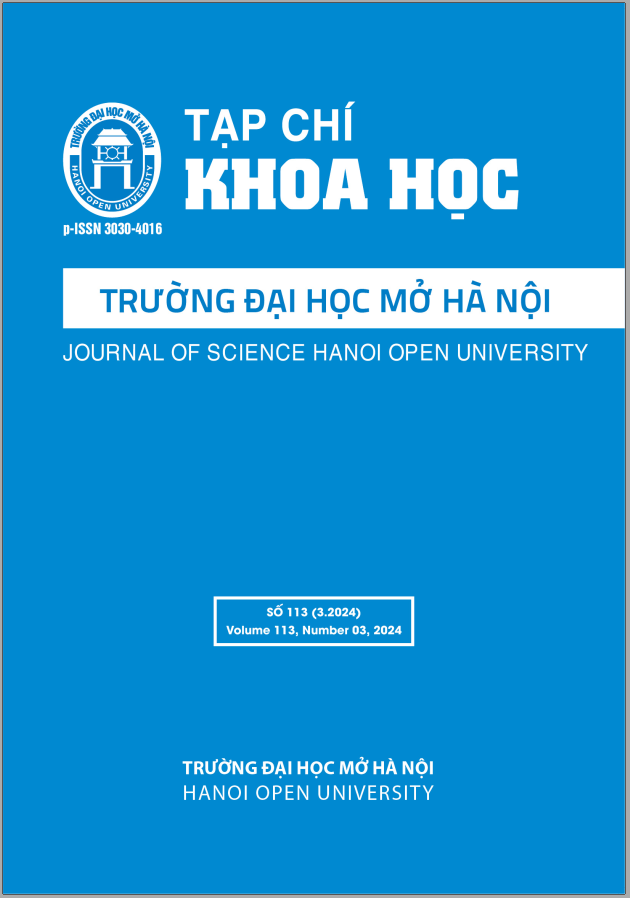FACTORS INFLUENCING THE ENTREPRENEURIAL INTENTIONS OF COLLEGES STUDENTS IN THE AREA OF CAN THO CITY
DOI:
https://doi.org/10.59266/houjs.2024.373Keywords:
Can Tho City, colleges, entrepreneurship, intention, studentsAbstract
This article aims to analyze factors influencing the entrepreneurial intentions of colleges students in Can Tho City. The analysis is based on survey data collected from 350 final-year students in various colleges within the city. Analytical methods used in this study include: Method of testing the reliability of the scale using Cronbach's alpha coefficient, exploratory factor analysis method and multiple linear regression. The results reveal that factors affecting students' entrepreneurial intentions include Attitude, knowledge provided by the school, and External factors. Among these, Attitude emerges as the most influential factor shaping the entrepreneurial intentions of colleges students in Can Tho City. These findings provide a scientific foundation for educational institutions to develop strategies encouraging students to engage in entrepreneurship immediately after graduation.
References
[1]. D.B. Audretsch. Entrepreneurship capital and economic growth. Oxford Review of Economic Policy, 2007, 23 (1), 63-78, doi:10.1093/oxrep/grm001
[2]. E. Santarelli, M. Carree, I. Verheul. Unemployment and Firm Entry and Exit: An Update on a Controversial Relationship. Regional Studies, 2009, 43(8), 1061-1073, doi:10.1080/00343400801968361.
[3]. A. Fayolle, F. Liñán. The future of research on entrepreneurial intentions. Journal of Business Research, 2014, 67(5), 663-666,
doi: http://dx.doi.org/10.1016/j.jbusres.2013.11.024.
[4]. B. Bird. Implementing entrepreneurial ideas: The case for intention. Academy of Management Review, 1988, 13(3), 442-453.
[5]. V. Souitaris, S. Zerbinati, A. Al-Laham. Do entrepreneurship programs raise entrepreneurial intention of science and engineering students? The effect of learning, inspiration and resources. Journal of Business Venturing, 2007, 22(4), 566-591, doi:http://dx.doi.org/10.1016/j. jbusvent.2006.05.002.
[6]. M.E. Tubbs, S. E. Ekeberg. The role of intentions in work motivation: implications for goal-setting theory and research. Academy of Management Review, 1991, 16(1), 180-199, doi:10.5465/ amr.1991.4279004.
[7]. S. Shane, S. Venkataraman. The Promise of Entrepreneurship as a Field of Research. Academy of Management Review, 2000, 25(1), 217-226,
doi:10.5465/amr.2000.2791611.
[8]. I. Ajzen. The theory of planned behavior. Organizational behavior and human decision processes, 1991, 50(2), 179-211.
[9]. P.B. Robinson. Prediction of entrepreneurship based on attitude consistency model. Unpublished doctoral dissertation, Brigham Young University. Dissertation Abstracts International, 1987, 48, 2807B.
[10]. W. Wang, L. Wei, K.M. John. Determinants of Entrepreneurial Intention among college students in China and USA. Journal of Global Entrepreneurship Research, 2011, 1(1), 35-44.
[11]. M. Chand, M. Ghorbani. National culture, networks and ethnic entrepreneurship: A comparison of the Indian and Chinese immigrants in the US. International Business Review, 2011, 20(6), 593-606, doi:10.1016/j.ibusrev.2011.02.009.
[12]. M. Pruett, R. Shinnar, B. Toney, F. Llopis, J. Fox. Explaining entrepreneurial intentions of university students: a cross-cultural study. International Journal of Entrepreneurial Behaviour & Research, 2009, 15(6), 571-594,
doi:10.1108/13552550910995443.
[13]. Francisco Liñán, Juan Carlos Rodriguez- Cohad and José M.Rueda- Cantuche. Factors Affecting entrepreneurial intention levels, a role for education. International Entrepreneurship and Management Journal, 2011, 7(2), 195-218.
[14]. Nguyen Ha Thu, Nguyen Duc Dung, Le Hoang Loc, Do Hoang Son, Nguyen Nhat Bon. Tac dong cua giao duc khoi nghiep den y dinh khoi nghiep cua sinh vien tai Viet Nam. TNU Journal of Science and Technology, 2023, 228(11), 99 - 106,
doi: https://doi.org/10.34238/tnu-jst.7908.
[15]. Hoang Kim Toan, Truong Quy Tung, Nguyen Van Huan, Đao Thị Thuy Trang. Phan tich cac yeu to anh huong den y dinh khoi nghiep sang tao cua sinh vien Dai hoc Hue. Tap chi Khoa hoc Dai hoc Hue: Khoa hoc Xa hoi va Nhan van, 2022, 131(6A), 209-225, doi: 10.26459/hueunijssh.v131i6A.6585.
The author is responsible for this article: Nguyen Minh Tan, Can Tho University of Technology.
